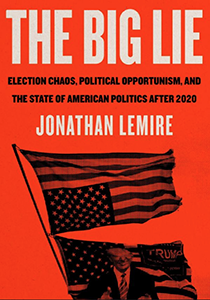||| BOOK REVIEW BY JENS KRUSE |||

Jonathan Lemire — the White House bureau chief at Politico and a regular contributor to MSNBC’s Morning Joe — opens his book, The Big Lie: Election Chaos, Political Opportunism, and the State of American Politics After 2020, with a scene on August 1, 2016 at the Greater Columbus Convention Center. During a campaign rally, Donald Trump said: “I’m afraid the election is going to be rigged, I have to be honest”(2) and with that sentence “threatened the tradition of peacefully contested American elections and challenged the very essence of a fair democratic process” (2).
Lemire continues:
It had begun. The seeds of the Big Lie had been planted. A celebrity candidate with little regard for the truth had publicly doubted the intrinsic fairness of America’s most sacred democratic institution, taking the first step on a journey that would undermine the integrity of the presidency, fuel a violent insurrection at the US Capitol, imperil voting rights ahead of the 2022 and 2024 elections, and forever change both political parties. (2)
In the twelve deeply reported chapters that follow, Lemire traces the steps of that journey. The chapter titles descriptively encapsulate these steps: “The Beginning,” “2016,” “The Trump Presidency,” “The Democrats,”“Conservative Reinforcements,” “2020,” “The Election,” “January 6,” “The Grip Tightens,” “The States,” Challenges,” “The Campaigns to Come.”
These chapters explain in detail how that one sentence uttered on August 1, 2016 grew into the Big Lie: how by endless repetition and elaboration, by amplification in parts of cable news, in social media and conspiracy theory websites, it corroded the minds of significant segments of our citizenry.
They also make clear that inaction is just as dangerous as action: the fact that a majority of Republicans, even though many of them know that the Big Lie is indeed a big lie, refuse to say so, and thus perpetuate its life and strengthen its power.
If anyone had any doubts about the power and the danger of the Big Lie, January 6 — which Lemire chronicles vividly in what in many ways is the central chapter of this book — should have emphatically, and violently, disabused them of that notion. But even this searing day, Lemire makes clear, did not bring the pernicious effects of the Big Lie to an end. The assaults on voting rights, on democracy, on the truth itself, continue unabated, and arguably with increasing strength.
By late 2021, Trump and many Republican state legislatures tried to stack the deck by a variety of means.
…this time, elections could actually be rigged. And Trump and his allies were trying to rig them. Trump’s claims were not dead: they were alive and well and shaping the battle for the ballot. The Big Lie would not just define the 2020 election. It was intent on dominating 2022 and 2024 as well. (206) A little later in his book Lemire concludes: “The Big Lie was not fading. It was gaining steam (227).”
Lemire’s book presents a complex account and analysis of our current historical, political, and societal situation, but If there is one lesson at least this reader came away with it is this: the forces of destruction unleashed on January 6, 2021 have not been decisively defeated.
Or, as Lemire puts it in the final pages of his book:
The Big Lie was born in 2016. Over the next six years, the man who gave it life used it to undermine the nation’s faith in its civic institutions and in the process of democracy itself. It had, via cable news, corrupted viewers and inspired dictators. It was faithfully repeated by political allies who were afraid of Trump and his followers. It was used to justify an abuse of power and the workings of government. It had challenged Democrats to battle among themselves to protect the ballot. It inspired an insurrection at the US Capitol, posing the greatest threat to the republic itself since the Civil War. And it lives on.(277-78)
Jonathan Lemire’s The Big Lie: Election Chaos, Political Opportunism, and the State of American Politics After 2020 (New York: Flatiron Books, 2022) can be obtained through Darvill’s Bookstore and is available from the Orcas Library.
**If you are reading theOrcasonian for free, thank your fellow islanders. If you would like to support theOrcasonian CLICK HERE to set your modestly-priced, voluntary subscription. Otherwise, no worries; we’re happy to share with you.**









I hope the author reveals the real culprit: TOO MUCH INFORMATION to the masses. What’s happened to the idea of only receiving what one has a “need to know”,? It’s like, instead of having two paths diverging “in a yellow wood”; there have been dozens, if not hundreds of paths, many put forth by one sick man and his followers., because he could, and can. We begin to doubt, to, distrust and pull into our own beliefs, or lash out at others. Think back: former presidents, like Roosevelt were protected by being able to hide their physical deformities, their deliberations, or the way they brushed their teeth;..and only publish information that would keep the public on the best path for the situation, even if they may have chosen to offer ” the one less traveled by”.
You have written eloquently elsewhere, Jens, about an earlier Big Lie — that the German Social Democrats had stabbed its armed forces in the back by agreeing to surrender terms of the Allies in November 1918. That Big Lie, as you noted, led directly to Adolf Hitler and the Third Reich.
I wonder where Trump’s Big Lie is leading the United States — hopefully not to a similar end.
Yes, Michael, that Big Lie certainly contributed to the rise of the Nazi Party, and all the subsequent catastrophes.
I provide the link to the Orcas Currents article here:
https://orcascurrents.com/a-stab-in-the-back-of-american-democracy/
Thanks, Jens. As I recall, you were among the first to make this comparison.
The Bib Lie is a very accurate title for this book. Except the everything in the book is reversed; everything stated is a complete lie.